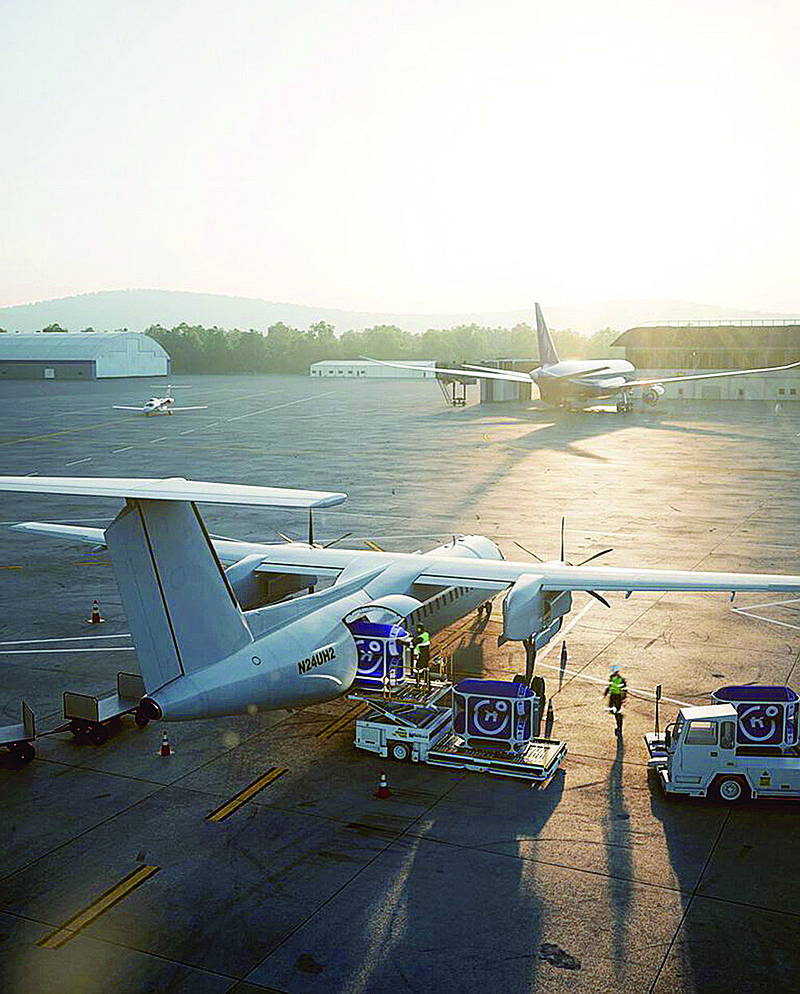The dream - and the hype - of hydrogen-powered, zero-emissions aviation will prepare for takeoff from Moses Lake in Central Washington.
An ambitious new project aims to modify small regional turboprop aircraft there to fly on hydrogen fuel, test and certify them to carry passengers, and potentially offer a long-term solution to aviation's carbon emissions by demonstrating that hydrogen aviation is economically viable.
Los Angeles-based startup Universal Hydrogen, led by Paul Eremenko, former chief technology officer and leading clean energy visionary at both Airbus and United Technologies, is developing the technology to retrofit mid-sized turboprop aircraft to run on hydrogen.
Partnering with Universal Hydrogen are aerospace engineering and certification firm AeroTEC of Seattle, electric motor company MagniX of Everett and New York-based Plug Power, which has a hydrogen fuel cell facility in Spokane.
"Our goal is to have butts in seats on commercial, revenue-generating flights as quickly as possible, said Eremenko in an interview, adding that he anticipates achieving Federal Aviation Administration certification in 2025.
Challenging technology
First up for retrofit is the De Havilland Canada DHC-8 turboprop, commonly known as the Dash 8.
The version that will be converted is not the larger model flown locally by Alaska Airlines but a smaller one that typically seats about 50 passengers.
The company plans to tear out 10 seats to accommodate the large capsules full of hydrogen that will be the plane's fuel, reducing the capacity to about 40 passengers.
Later, the project will do the same modification for the ATR 72 turboprop, with seating reduced to about 58 passengers post-conversion.
The technology that must be developed is complex and will require innovation.
Universal Hydrogen proposes to set up an extensive logistics infrastructure to deliver to airports twin packs of 7-foot-long, 3-foot-diameter capsules of hydrogen that can be loaded and unloaded quickly.
Plug Power, which currently builds ground-based hydrogen fuel cells that generate electricity from hydrogen, will have to develop much lighter fuel cells that are certifiable to airplane safety standards.
MagniX will build the motors that use the electricity to turn the propellers. It has already built similar motors for battery-powered electric airplane prototypes.
Linking all this together, Universal Hydrogen must integrate all the ancillary equipment wrapped around the fuel cell and the electric motor, including the electronic control algorithms for the entire system as well as compressors, humidifiers and the cooling systems for the fuel cell and the motor.
Batteries will be added for reserve power.
AeroTEC's engineers, meanwhile, will have to modify the airframe - designing a new cargo door through which to load the hydrogen capsules and holding fixtures for all the equipment - and then shepherd the complete aircraft through the FAA certification process.
Roei Ganzarski, CEO of MagniX, which employs about 60 people in Everett, said this work represents the future of aerospace. Having it all here in Washington, he said, "puts the state in a position of leadership for all things electric aviation."
Eremenko attributed his choice of Moses Lake to the "tremendous aerospace and cleantech workforce" in the region.
Emily Wittman, CEO of the state trade group the Aerospace Futures Alliance, said "the possibilities for our state's aviation sector are enormous."
Lee Human, president of AeroTEC, which has a total workforce of about 250, said he expects about 30 people to work on the hydrogen project initially, expanding if it's successful and turns into a full modification line in Moses Lake for retrofitting multiple aircraft.
He said he expects to begin modifying an actual aircraft early next year. Testing will begin with one engine using hydrogen and the other conventional gas before both are converted. Certification will take several years.
Human sees a large market for zero-emissions aircraft, both passenger and cargo, that can fly out of small, underserved airports at very low cost.
"There are a lot of candidate aircraft that could be modified," he said. "Amazon just bought a bunch of ATR 72s."
Silicon Valley backing
Eremenko, a Ukrainian-American prodigy who worked at Google and Motorola and led the U.S. government's drone research unit at DARPA before joining Airbus, founded Universal Hydrogen last year, at the outset of the COVID-19 pandemic.
The startup secured $20 million in initial funding earlier this year, led by Silicon Valley venture fund Playground Global, with backers including Plug Power, Airbus, JetBlue, Toyota and New York-based hedge fund Coatue.
Its advisory board includes former Airbus CEO Tom Enders and the European giant's former head of sales, John Leahy.
Eremenko estimates it will take about $300 million to achieve certification of the regional planes.

